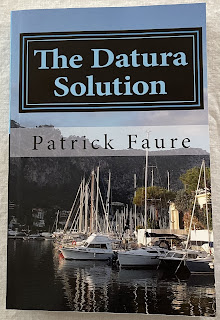READ
Trying to find a book to read for Monaco was no easy feat. The
best that Ann Morgan, who was my inspiration for this blog, was able to come up
with was a biography of Princess Grace. So I was thrilled when I found out that
an author born in Monaco had written a thriller in English.
My excitement didn’t even last through the first chapter. The Datura Solution, by Patrick Faure, was pretty terrible. The protagonist is a man named Max Foreman, who is part of some sort of black ops mission for the United States, even though he is from Monaco. The first part of the book, which has virtually no connection to the second part of the book, follows his exploits during a mission that goes bad in Algeria, forcing Max to sneak into Morocco and then later flee to Spain. As nearly as I can tell, the only purpose for the first 155 pages is to place Max at the location where he will meet Elena McMillan, the wife of the U.S. Ambassador to Spain.
Elena is a beautiful young Russian woman, a former model, who was previously married to the extremely rich oligarch, Oleksandr Krasnaief. When he dies suddenly, she marries her lover, a U.S. diplomat named George McMillan. McMillan is a thoroughly despicable man, a womanizer whose reason for wanting to marry Elena is to get his hands on the billions of dollars left to her by her late husband. With the help of Elena’s money and connections, he becomes the Ambassador to Spain.
His own loathsomeness and Elena’s growing fondness for Max, who rescues her from a life-threatening situation, help to prevent George from getting his hands on Elena’s fortune. A battle ensues.
This book was riddled with errors – proofing, grammatical, and translation – which made reading it a challenge. Add to that various plot inconsistencies, lurid and disgusting sex and torture scenes, and confusing action sequences and you end up with a book that is not worth the purchase price. I was horrified to see it described online as “Book 1 in the Max Foreman Series,” which means the author is working on a second book.
I learned nothing about Monaco from The Datura Solution, and I wouldn’t recommend it to anyone. For others who are doing a reading-the-world challenge, I hope a better book by a Monégasque author is available by the time you’re ready to read a book from Monaco.
COOK
In searching the Internet for a Monégasque dish to prepare, I discovered a popular street food
snack called socca.
Made with chickpea flour, socca is a type of savory crepe. The recipe I found
on the Global Table Adventure website could not have been any easier. Like the
creator of the recipe, I didn’t have any chickpea flour, but I did have garbanzo
fava flour. Unfortunately, I wasn’t a fan of the socca. If I found a vendor
selling it on the streets of Monte Carlo, I’d definitely buy some, though, if
only to find out what it’s really supposed to taste like.
GIVE
My donation to the country of Monaco went to the Institut Océanographique, which seeks to educate people about the
importance of the oceans and the need to protect them. It was founded in 1906
by Prince Albert I, and continues to be supported by the current Prince Albert
and the government of Monaco. The Institut Océanographique includes a museum with
an aquarium and other natural history exhibits. More information about the
Institut Océanographique is available at: L'Institut Océanographique de Monaco,
Fondation Albert 1er. (oceano.org).
NEXT STOP: MONGOLIA





